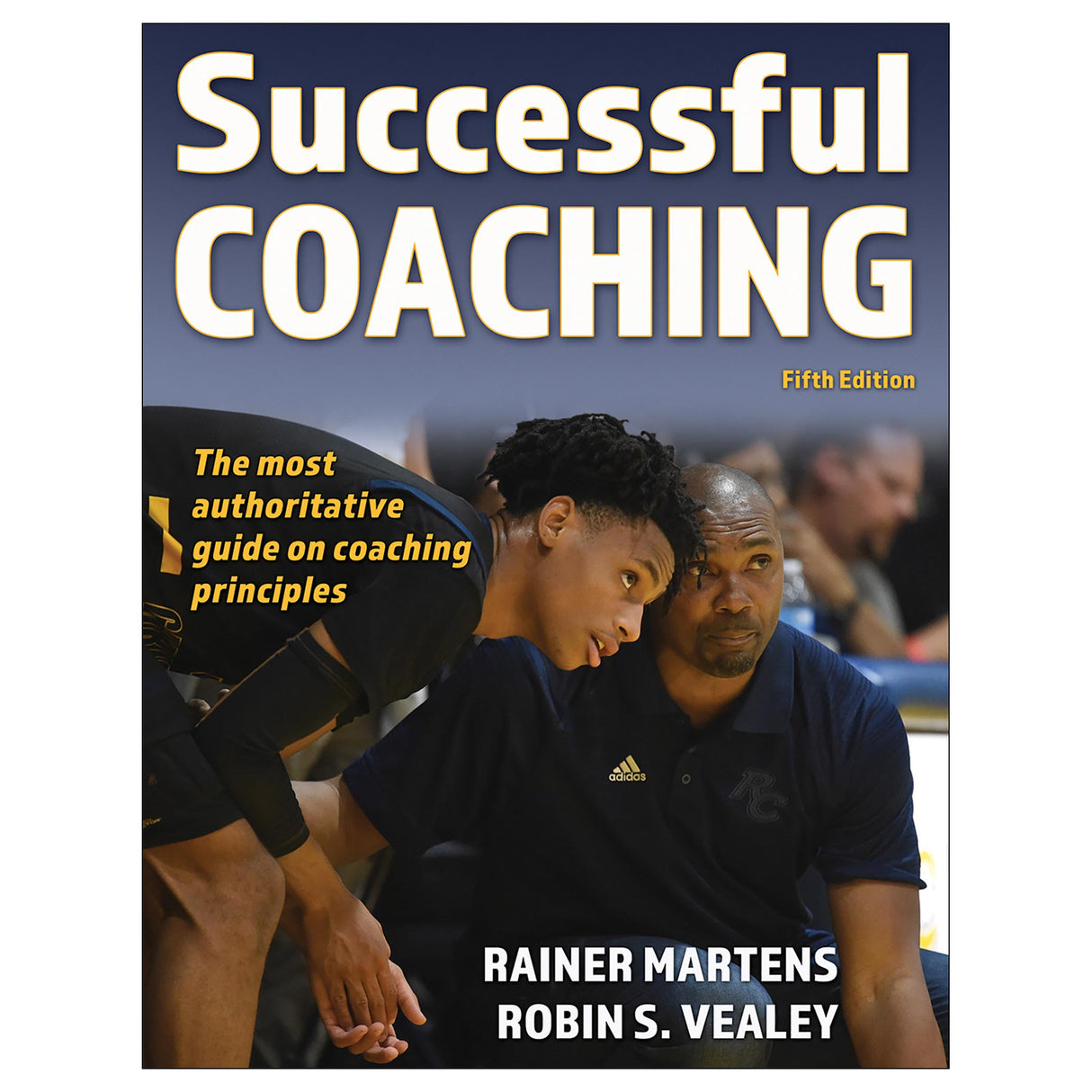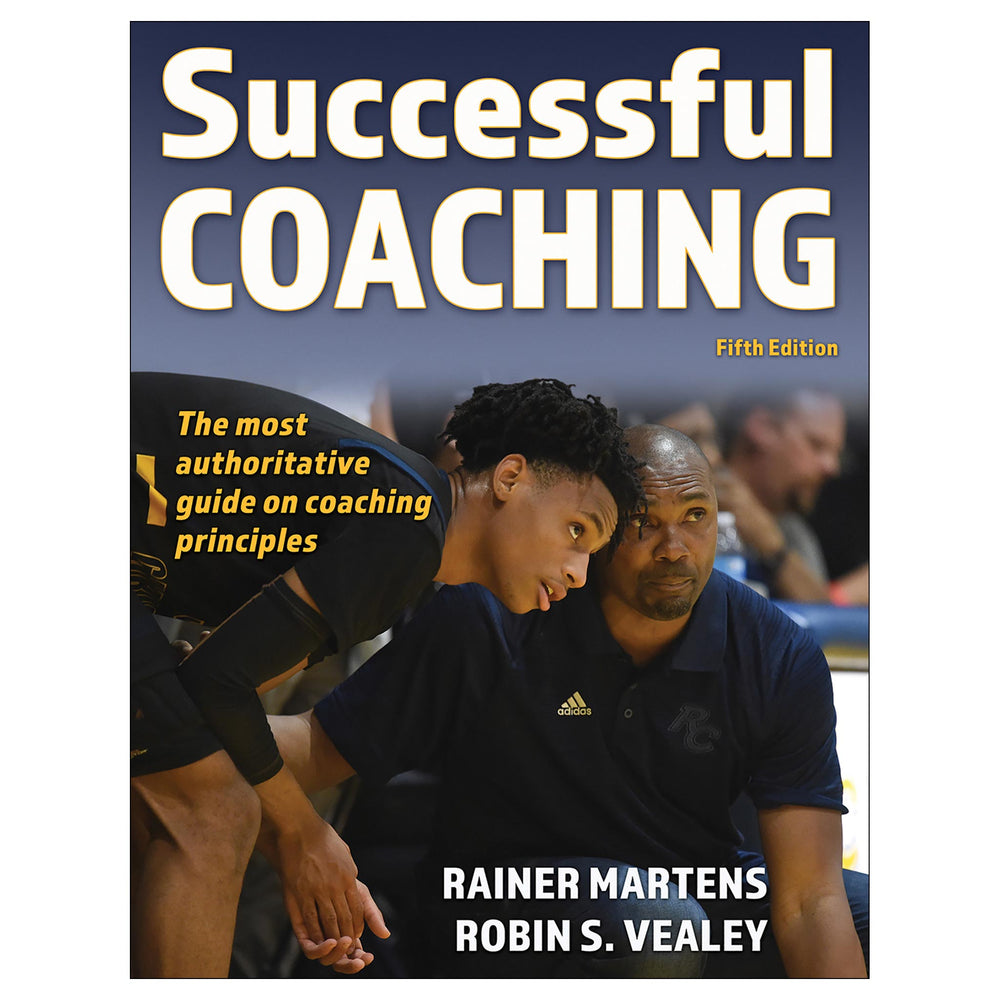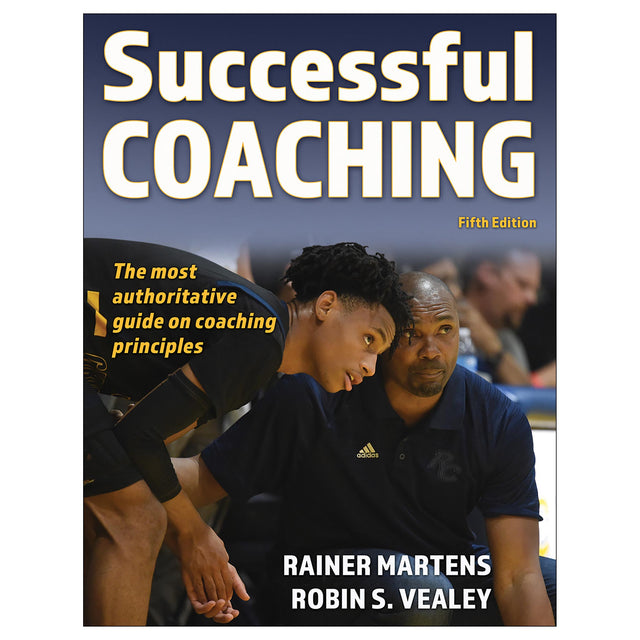Successful Coaching 5th Edition epub
Author: Rainer Martens, Robin S. Vealey
$83.95 CAD
Access Duration: 10 Years
Successful Coaching will help you think critically about your approach to coaching and develop the skills and wisdom to fulfill your many responsibilities as coach:
- Identify your coaching philosophy and coaching objectives
- Build relationships with players and staff and promote teamwork
- Nurture positive decision making and sportsmanship to develop more mature individuals
- Coach athletes of diverse backgrounds, characteristics, interests, and abilities
- Teach and practice sport skills and strategies using the games approach
- Train, condition, and fuel athletes using sound principles and methods
- Organize and guide your team and sport program
- Manage relationships with administrators, officials, parents, and media
- Minimize risk and meet your legal duties as a coach
- Mental health issues, including depression, anxiety, and disordered eating
- Race, ethnicity, and sexual orientation in youth sport
- Sexual harassment and abuse
- Motivation, corrective discipline, and burnout
- Alcohol consumption, drug use, and vaping
Written by coaches for coaches, Successful Coaching is a practical, readable, and useful resource that you’ll refer to throughout the season and cherish more than your playbook.
Successful Coaching is the text for Human Kinetics’ Coaching Principles course. Coaching Principles is recognized by numerous state high school and athletic directors’ associations, school districts, national governing bodies, and other sport organizations as meeting coaching education and certification requirements. In addition, hundreds of colleges and universities have adopted Coaching Principles for graduate and undergraduate coaching programs.
Note: A code for accessing HKPropel is included with all print books.
Audience
Middle school and high school coaches taking the Coaching Principles course to achieve coaching certification, as well as college and university students taking the Coaching Principles course as part of their curriculum. Also a reference for any coach of athletes ages 12-20.Chapter 1. Developing Your Coaching Philosophy
Why Philosophy?
Examples of Coaching Philosophies in Practice
Developing Your Coaching Philosophy
Wrap-Up
Chapter 2. Determining Your Coaching Objectives
Three Major Objectives of Coaching
Athletes First, Winning Second
Your Personal Reasons for Coaching
Wrap-Up
Chapter 3. Providing Effective Leadership
The Powerful Influence of Coaches
Coaching Styles
Leadership Strategies for Coaches
Leadership Is a Skill You Can Develop
Coaching Code of Ethics
Wrap-Up
Chapter 4. Coaching Diverse Athletes
Maturational Differences in Young Athletes
Cultural Competence
Gender Considerations in Coaching
Understanding Sexual Orientation
Race and Ethnicity in Youth Sport
Disability and Youth Sport
Mental Health in Athletes
Preventing Sexual Harassment and Abuse in Youth Sport
Wrap-Up
Part II. Understanding and Managing Athletes’ Behavior
Chapter 5. Communicating With Your Athletes
Communication as a Complex Process
Evaluating Your Communication Skills
Developing Your Communication Skills
Coaching and Social Media
Wrap-Up
Chapter 6. Motivating Your Athletes
Basics of Motivation
Need for Fun and Stimulation
Need for Acceptance and Belonging
Need to Feel Competent
Need for Autonomy
From Motivation to Anxiety and Burnout
Is It Wise to Specialize?
Wrap-Up
Chapter 7. Using Discipline and Rewards With Athletes
A Positive Discipline Approach
Preventive Discipline
Corrective Discipline
Using Rewards Effectively
Wrap-Up
Chapter 8. Coaching for Character
What Character and Sportsmanship Mean
Why Is Character Development an Important Coaching Objective?
How to Teach Character and Sportsmanship
Wrap-Up
Part III. Being a Great Teacher
Chapter 9. The Games Approach
Technical and Tactical Skills
Traditional Approach
Essence of the Games Approach
Evaluating the Games Approach
Wrap-Up
Chapter 10. Teaching Technical Skills
Learning Technical Skills
Three Stages of Learning
Teaching Technical Skills
Wrap-Up
Chapter 11. Teaching Tactical Skills
Tactics and Tactical Skills
Reading the Situation
Tactical Knowledge
Decision-Making Skills
Teaching Tactical Skills
Wrap-Up
Chapter 12. Planning for Teaching
Benefits of Planning
Step 1: Identify the Skills Your Athletes Need
Step 2: Know Your Athletes
Step 3: Analyze Your Situation
Step 4: Establish Priorities
Step 5: Plan Practices
Wrap-Up
Part IV. Physical Training and Nutrition
Chapter 13. Training Basics
Fitness for Sport and Physical Training
Coach’s Role in Physical Training
Training Principles
Wrap-Up
Chapter 14. Energy Fitness Training
Energy and Energy Fitness
Physiology of Energy Systems
Energy Demands of Your Sport
Measuring Energy Fitness
Designing an Energy Fitness Training Program
Wrap-Up
Chapter 15. Muscular Fitness Training
Muscular Fitness Defined
How Muscles Work
Training for Muscular Fitness
Muscular Demands of Your Sport
Testing Muscular Fitness
Designing a Muscular Fitness Program
Wrap-Up
Chapter 16. Fueling Your Athletes
Coach’s Role
Six Basic Nutrients
The Athlete’s Diet
Nutrition Supplements
Hydration
When and What to Eat
Wrap-Up
Chapter 17. Drugs in Sport
Drugs 101
Your Role in Education and Prevention
When Athletes Have a Drug Problem
Wrap-Up
Part V. Management Skills for Coaches
Chapter 18. Managing Your Team
Coaches’ Management Responsibilities
Policy Manager
Information Manager
Personnel Manager
Instructional Manager
Event and Competition Manager
Logistics Manager
Financial Manager
Wrap-Up
Chapter 19. Managing Relationships
Interpersonal Skills
Special Relationships
Chapter 20. Managing Risk
The Legal System
Risk Management Process
Immunity
Coaches’ Legal Duties
Other Duties
Waivers and Participation Agreements
Insurance
Wrap-Up
Epilogue





